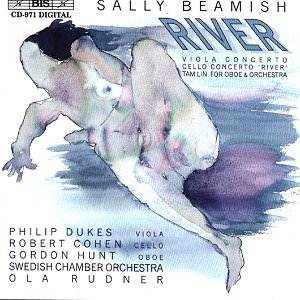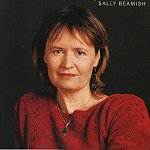
Sally Beamish's music has been underrepresented on CD for far too long. This
superb release puts right that omission but it does much more than that:
it provides first-rate performances of three of her most dramatic and personal
compositions in excellent digital sound.
The Viola Concerto is one of the composer's most personal works. The viola
was her own instrument and the theft of it caused her to take up full-time
composition. At the same time, she reassessed her life, realised she wanted
to be a composer rather than an orchestral viola player, rediscovered her
religion and had her first baby. All these factors came together as catalysts
for the composition of the Viola Concerto. It is inspired by the New Testament
story of Peter's denial of Christ, something that struck a chord with Sally
Beamish as she felt she was denying her own calling all the years she played
in an orchestra instead of composing. Thus, the concerto may be seen as a
way of working out her own denials. It is a passionate work of great emotional
intensity and a valuable addition to the repertoire for which viola players
must be thankful. It begins with a depiction of the procession from Gethsemane
and features the three denials of Christ (represented by the solo viola).
These denials take the form of three cadenzas in which the solo instrument
is questioned by another solo instrument from the orchestra - clarinet, cello
and horn. The striking of Jesus is depicted by a whip crack, the timpani
represent the crowing of the cock and the following passage, marked "tearfully",
charts Peter's mixed emotions from desperation to hope. Even without a knowledge
of the imagery which inspired it, Sally Beamish's Viola Concerto is a powerful
work which communicates directly with the listener. The performers do the
piece justice and it makes a thrilling start to the disc.
The Cello Concerto, subtitled "River" after the collection of poems by Ted
Hughes which inspired it, is a more directly accessible work than the Viola
Concerto. I was present at River's first performance with the soloist Robert
Cohen and the Academy of St Martin-in-the-Fields conducted by Neville Marriner
at the Barbican in 1996. The performance on this disc is even finer than
that premiere, allowing the listener to hear every texture of the poetically
constructed score. The instrumentation of the four movements is generally
light and airy, with the exception of the sumptuously beautiful third movement
"Low Water". If you want to sample one track from this disc to discover whether
Sally Beamish's music is for you I would recommend you start with this
ravishingly scored movement (track 4 on the CD), characterised by the velvety
sound of rich and dark divided cellos.
"Tam Lin", based on the Scottish legend of that name, is another dramatic
concerto in which the eponymous hero is played by an oboe soloist. The idea
of transformation and variation attracted Sally Beamish to this story and
thus the work takes the form of a series of extended and elaborate variations,
in the manner of Richard Strauss's Don Quixote. The scoring of the work is
unusual: no violins but a battery of percussion: anvil, tom toms, marimba,
piccolo side drum, bell tree and wind chimes. The latter has an important
role to play (an explanation of which is unaccountably missing from the programme
notes in the CD booklet). At the very end of the piece when the Fairy Queen
puts a curse on Tam Lin and his lover Janet, the wind chimes must be dropped
on the floor - a hair-raising ending to the work. Another overtly dramatic
piece, "Tam Lin" is almost a tone poem with soloist rather than a fully-fledged
concerto and it makes a virtuosic conclusion to the disc.

This is a long overdue CD of some of Sally Beamish's most important scores.
I hope it will the first of many releases of her orchestral music (there
are two symphonies, a Concerto Grosso, a deeply moving violin concerto inspired
by the anti-war novel "All Quiet on the Western Front" and many other works
which merit a CD release (her monodrama "Monster" would make an ideal companion
on disc to H K Gruber's "Frankenstein"). All the performances on this CD
are as near perfect as one can imagine. The Viola and Cello Concertos are
played by the very soloists who gave the first performances so there is little
doubt as to the authenticity of those performances and Gordon Hunt gives
a splendid account of the difficult solo oboe part in "Tam Lin". The Swedish
Chamber Orchestra play to the manner born (Sally Beamish is their
composer-in-residence and was no doubt able to advise the players on matters
of style, tempi and dynamics). I look forward to many more of Sally Beamish's
works form this source and I recommend the disc unreservedly.
Reviewer
Paul Conway


